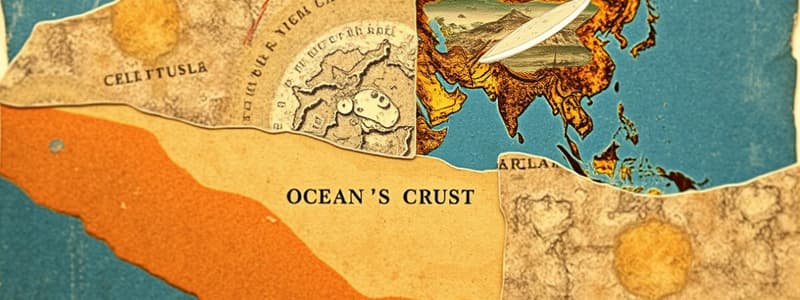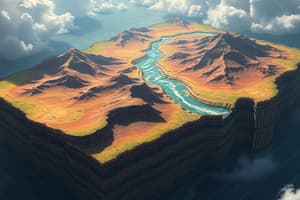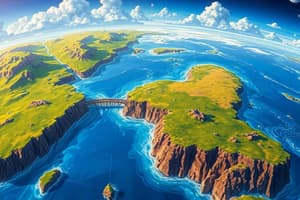Podcast
Questions and Answers
What is the approximate thickness of oceanic crust?
What is the approximate thickness of oceanic crust?
- 70 km
- 5 km (correct)
- 40 km
- 2-5 km
Which material primarily composes continental crust?
Which material primarily composes continental crust?
- Iron
- Granite (correct)
- Nickel
- Basalt
What distinguishes the upper mantle from the lower mantle?
What distinguishes the upper mantle from the lower mantle?
- Thickness (correct)
- Temperature
- Composition
- Density
What is the primary phase of the outer core?
What is the primary phase of the outer core?
Which layer of the Earth is primarily composed of molten rocks that are in motion?
Which layer of the Earth is primarily composed of molten rocks that are in motion?
How does the density of Earth's layers generally change with depth?
How does the density of Earth's layers generally change with depth?
What are the two main types of crust found on Earth?
What are the two main types of crust found on Earth?
What generates heat in the Earth's core?
What generates heat in the Earth's core?
Which of the following is a characteristic of the mantle layer of the Earth?
Which of the following is a characteristic of the mantle layer of the Earth?
Which of the following statements correctly describes the inner core?
Which of the following statements correctly describes the inner core?
What distinguishes mechanical layers from compositional layers of the Earth?
What distinguishes mechanical layers from compositional layers of the Earth?
What is a key characteristic of the outer core of the Earth?
What is a key characteristic of the outer core of the Earth?
Which statement best describes the properties of the inner core?
Which statement best describes the properties of the inner core?
What function does the lithosphere serve among the mechanical layers?
What function does the lithosphere serve among the mechanical layers?
What is the main characteristic of the Earth's crust?
What is the main characteristic of the Earth's crust?
Which layer of the Earth is considered the thickest?
Which layer of the Earth is considered the thickest?
What is a key feature of the outer core?
What is a key feature of the outer core?
What primarily makes up the inner core of the Earth?
What primarily makes up the inner core of the Earth?
How do compositional layers differ from mechanical layers of the Earth?
How do compositional layers differ from mechanical layers of the Earth?
What type of rock is primarily found in the Earth's crust?
What type of rock is primarily found in the Earth's crust?
Which layer sits directly below the Earth's crust?
Which layer sits directly below the Earth's crust?
Which of the following statements is true regarding the mantle?
Which of the following statements is true regarding the mantle?
Flashcards are hidden until you start studying
Study Notes
Crust
- Thinnest layer of the Earth, varying from 2 miles (ocean floor) to 75 miles (mountains).
- Composition mainly includes silicon and aluminum.
- Divided into two types: Oceanic Crust and Continental Crust.
- Oceanic crust: Approximately 5 km thick, made of dense basalt, and primarily below sea level.
- Continental crust: Between 40 and 70 km thick, comprised of less dense granite, mostly above sea level.
- Represents only 1% of Earth's total volume, likened to the skin of an apple.
Mantle
- Largest layer, constituting 70% of Earth's mass.
- Divided into two regions: Upper Mantle and Lower Mantle.
- Upper Mantle: Located just below the crust, features magma storage and movement in convection currents.
- Lower Mantle: Very thick layer with molten rock in circular motion.
Outer Core
- Composed of hot, melted metals, primarily iron and nickel.
- Liquid state contributes to Earth's magnetic field.
Inner Core
- Solid sphere made mainly of iron.
- Heat generated by radioactive decay of elements such as uranium.
Relationship of Layers
- Temperature and density increase with depth.
- Crust, mantle, and core are categorized into compositional and mechanical layers:
- Compositional: Crust, Mantle, Core
- Mechanical: Lithosphere (crust), Asthenosphere (upper mantle), Mesosphere (lower mantle), Outer Core, Inner Core.
Interactive Mechanics
- Group activities involve dividing members to focus on different layers for discussion and illustration.
- Each group creates a cohesive definition of Earth's layers based on collected facts.
Riddles about Earth's Layers
- Earth: Described as a spherical entity with three hidden layers beneath the surface.
- Crust: Analogous to the pizza base, where many activities or "players" exist.
- Mantle: Thickest layer covered, associated with the coat metaphor.
- Outer Core: Encompasses the inner core, plays a role in volcanic activity.
- Inner Core: Described as small yet extremely hot, presenting danger to those who approach.
Journey to the Center of the Earth
- Essential items to bring include a map, flashlight, notebook, heat-resistant camera, food and water, extra clothes, and courage.
Studying That Suits You
Use AI to generate personalized quizzes and flashcards to suit your learning preferences.




